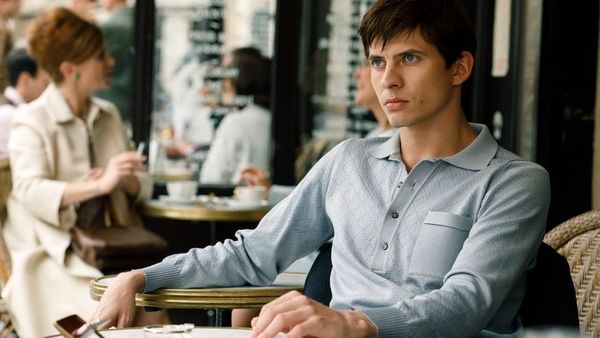Eye For Film >> Movies >> The White Crow (2018) Film Review
The White Crow
Reviewed by: Amber Wilkinson

You wait years for a ballet film to arrive and then get treated to a pas de deux - with Carlos Acosta biopic Yuli arriving in UK cinemas on March 29 and this film about Rudolf Nureyev gracing cinemas a week earlier.
Both films are not just linked by the art that their characters practice but also by a sense of being forced to jettison their heritage in order to make it to the top - with Acosta leaving behind Cuba for the rain-slicked streets of London and Nureyev defecting while on a tour to Paris.

This latter event, and the build up to it, forms one of three timelines that are woven together in Ralph Fiennes film about the Russian, with screenwriter Sir David Hare also focusing on Nureyev's impoverished childhood in the provincial city of Ufa and his early days as a dancer in Moscow. The result is an often compelling but slightly baggy film that would benefit from much less Nureyev the very young in favour of more of his youth and defection year. Interestingly, at the Scottish premiere this week at Glasgow Film Festival, Hare noted that he would have liked more to have been cut from the film - Fiennes should have listened.
All this is to take nothing away from Fiennes' direction in general - it has an enjoyable precision to it, which despite its disparate time periods, extends to making sure we always know exactly where we are through the use of colour coding. Nureyev's birth on a train and subsequent childhood are desaturated almost to the point of monochrome, with only red - the good old colour of the Motherland - retaining any impact. Scenes in Moscow major in rich browns, while the later Parisian episode is often dominated by the intense, almost 'technicolor' blue of the sky.
There are also some beautifully edited scenes which emphasise the sheer muscularity and energy required by dancers when, though the camera cuts away from Nureyev's exercise, we continue to hear his physical exertions. The camerawork from Mike Eley, also has a muscular energy to it that captures something of the wilfulness of the film's protagonist. Technical credits in general are top-notch, with Ilan Eskeri's score sitting supportively and unobtrusively next to familiar pieces of classical music.
Ukrainian dancer Oleg Ivenko, in his first acting role, is a good choice for the dancer, not just because of his impressively long eyelashes and equally accomplished dance scenes, but also because he carries himself more generally with a flowing dancer's comportment, which would be very hard for a regular star to replicate.
Fiennes also puts in a refreshingly different performance from many of the intense achievers he has turned in lately - including Ben Emmerson in Official Secrets - disappearing with a concentrated but effective mousiness into Nureyev's ballet coach Pushkin, who tells his student that technique is just the means not the end. These scenes in Moscow are added additional verisimilitude by being in Russian - Fiennes himself is a good speaker of the language - which also helps Ivenko, who later speaks broken English in the Paris section, no end.
Hare finds contrast between Nureyev's physical grace and his considerably more abrasive personality - the 'white crow' of the title is a Russian term referring to an outsider. The screenwriter suggests that his defection mainly stemmed from a fear of losing the freedom to dance and because he hated obeying the rules than from any strong politics - although there is room left for discussion.
In Paris, Nureyev shucks off his minders as much as possible, spending nights on the town with grieving socialite Clara Saint (Adèle Exarchopoulos) - and it's here that the films choppiness becomes most obvious, as it refuses to settle long enough to fully cut to the heart of Nureyev's relationships.
Still, tension arrives on cue during climactic scenes at the airport, stemming both from the situation and from the fact that we know Nureyev, the man, is not particularly sympathetic, increasing the sense of threat, even though history has already told us the outcome.
Reviewed on: 26 Feb 2019


















